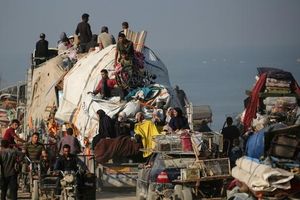When three NASA astronauts returned from their extended stay aboard the International Space Station (ISS) recently, they brought with them not only memories of their groundbreaking mission but also some significant health concerns. After nearly eight months in space, which was longer than initially planned due to complications with the Boeing Starliner crew capsule and rough weather, including Hurricane Milton, one of the crew members landed briefly in the hospital. Yet, when asked about which astronaut fell ill, Matthew Dominick, Michael Barratt, and Jeanette Epps remained tight-lipped about the specifics.
During their first public appearance post-mission, the astronauts politely refused to disclose which of them experienced health issues, citing medical confidentiality and NASA's strict guidelines on health matters. The crew, returning on October 25, alongside Russian cosmonaut Alexander Grebenkin, had been evaluated at a Pensacola hospital shortly after their splashdown off the Florida coast. Reports confirmed one American astronaut required hospitalization due to unspecified reasons but none provided any detail beyond the confirmation of the incident.
Dr. Michael Barratt, noted for his expertise in space medicine, emphasized the unpredictable nature of how astronauts' bodies respond to long durations in microgravity. "Spaceflight is still something we don’t fully understand. We’re finding things we don’t expect sometimes," Barratt remarked, hinting at the need for continued analysis of the situation.
He refrained from explaining the specific symptoms or conditions involved. This reticence has sparked considerable public curiosity and concern about astronauts' health, reinforcing discussions around the impacts of space travel on the human body.
Reflecting on their readjustment to life on Earth, the astronauts described their experience as both unusual and enlightening. Epps reported the challenges faced during reentry, highlighting how each astronaut adapts differently. "That’s the part you can’t predict," she stated, yet she maintained optimism, noting, "Every day is getting easier." Dominick shared his own challenges of reacclimatising; he mentioned how even simple activities like sitting comfortably on regular furniture were initially difficult, leading to surprising challenges for the astronauts back on Earth.
While the trio worked hard to readapt after months dealing with microgravity—all astronauts are required to exercise regularly to mitigate muscle and bone loss associated with prolonged absence of gravity—Dominick and his colleagues skipped the treadmill during some workouts as part of their research on future space missions, particularly the long-haul journeys envisioned for Mars. It remains unclear how these decisions will impact their long-term health after such significant sacrifices.
This mystery illness incident brings up important questions about health and safety measures for astronauts. It showcases the unknowns of human physiology when exposed to conditions encountered during space missions. Space agencies across the globe continue to research the long-term effects, aiming to prepare for longer missions which will no doubt extend beyond just the ISS.
Meanwhile, NASA’s Starliner—a key to future crewed missions on long-distance trips—is currently docked and expected to transport astronauts back from the ISS next year, marking continued partnerships and developments. Test pilots Butch Wilmore and Suni Williams, who are on the ISS until February, will engage with Starliner before returning home. With all eyes on advancements made, such as their response to medical emergencies, the space community remains focused on overcoming health-related challenges as humans continue their quest beyond Earth.



